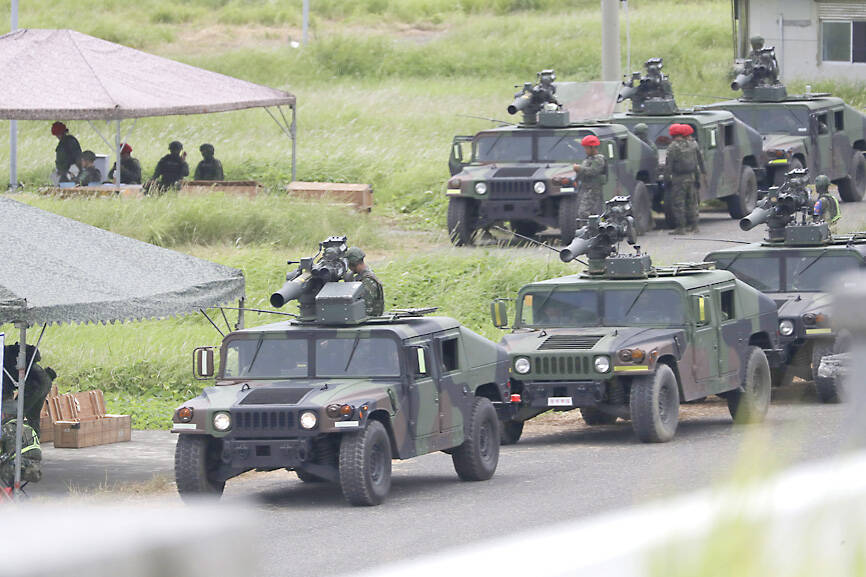Defense spending has yet to meet the Democratic Progressive Party’s (DPP) demands that it comprise 3 percent of GDP, with a report by the Legislative Yuan’s Budget Center early this month showing that it was at 2.14 percent, despite increasing spending and a special budget.
The DPP said in its 2014 Defense Blue Paper that defense spending by the administration of then-president Ma Ying-jeou (馬英九) did not reach 3 percent of GDP and was decreasing annually.
The paper urged the government at the time to increase spending to at least 3 percent of GDP.

Photo: Chiang Ying-ying, AP
The Budget Center’s report released on Aug. 1 showed that the annual budgets for the Ministry of National Defense from fiscal 2018 to fiscal 2023 under the DPP administration increased each year from NT$327.7 billion (US$10.25 billion) for 2018 to NT$409.2 billion for this fiscal year.
This year’s budget had NT$178.7 billion, or 43.66 percent, earmarked for “personnel operations,” NT$133.6 billion (32.64 percent) for “operations maintenance” and NT$97.0 billion (23.70 percent) for “military investment,” the report said.
The ministry also received a special budget of NT$45 billion for a new fighter jet program and NT$63.2 billion for its naval and air combat capability enhancement plans, bringing the ministry’s total budget to NT$517.5 billion, it said.
The report said that the overall budget is still experiencing difficulty due to rising costs for personnel and operations, which eat into the fund that can be used for equipment.
Payments for multiple foreign arms purchases need to be made soon, so the ministry must ensure that it has enough to fund autonomous defense programs, it added.
Institute for National Defense and Security Research analyst Shu Hsiao-huang (舒孝煌) on Wednesday said that if the government wants to have 3 percent of GDP spent on defense, it should foster systematic growth of spending instead of relying on special budgets.
With inflation taken into account, defense spending is not growing as much as the figures indicate, Shu said.
The ministry’s most significant problem is Taiwan’s declining birthrate, he said, adding that the military should consider sweeping changes to how it is structured and equipped, and introduce high technology and automated means to mitigate the lack of personnel.

Trips for more than 100,000 international and domestic air travelers could be disrupted as China launches a military exercise around Taiwan today, Taiwan’s Civil Aviation Administration (CAA) said yesterday. The exercise could affect nearly 900 flights scheduled to enter the Taipei Flight Information Region (FIR) during the exercise window, it added. A notice issued by the Chinese Civil Aviation Administration showed there would be seven temporary zones around the Taiwan Strait which would be used for live-fire exercises, lasting from 8am to 6pm today. All aircraft are prohibited from entering during exercise, it says. Taipei FIR has 14 international air routes and

Taiwan lacks effective and cost-efficient armaments to intercept rockets, making the planned “T-Dome” interception system necessary, two experts said on Tuesday. The concerns were raised after China’s military fired two waves of rockets during live-fire drills around Taiwan on Tuesday, part of two-day exercises code-named “Justice Mission 2025.” The first wave involved 17 rockets launched at 9am from Pingtan in China’s Fujian Province, according to Lieutenant General Hsieh Jih-sheng (謝日升) of the Office of the Deputy Chief of the General Staff for Intelligence at the Ministry of National Defense. Those rockets landed 70 nautical miles (129.6km) northeast of Keelung without flying over Taiwan,

City buses in Taipei and New Taipei City, as well as the Taipei MRT, would on Saturday begin accepting QR code payments from five electronic payment providers, the Taipei Department of Transportation said yesterday. The new option would allow passengers to use the “transportation QR code” feature from EasyWallet, iPass Money, iCash Pay, Jkopay or PXPay Plus. Passengers should open their preferred electronic payment app, select the “transportation code” — not the regular payment code — unlock it, and scan the code at ticket readers or gates, General Planning Division Director-General Liu Kuo-chu (劉國著) said. People should move through the

The Ministry of National Defense (MND) today released images of the military tracking China’s People's Liberation Army (PLA) movements during the latest round of Chinese drills around Taiwan. The PLA began "Justice Mission 2025" drills today, carrying out live-fire drills, simulated strikes on land and maritime targets, and exercises to blockade the nation's main ports. The exercises are to continue tomorrow, with the PLA announcing sea and air space restrictions for five zones around Taiwan for 10 hours starting from 8:30am. The ministry today released images showing a Chinese J-16 fighter jet tracked by a F-16V Block 20 jet and the